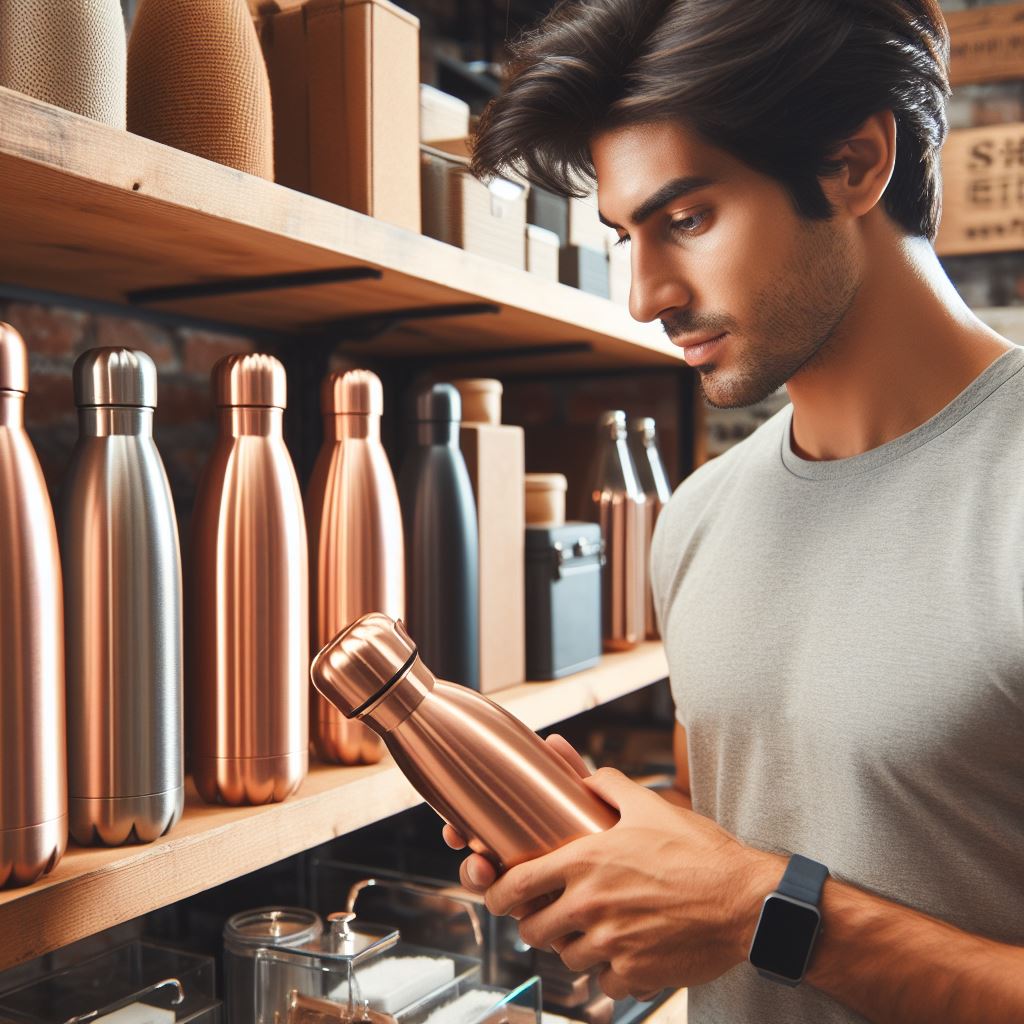Unveiling the Truth: The Safety of Copper Insulated Water Bottles
In recent years, copper insulated water bottles have gained significant popularity among health-conscious individuals, eco-enthusiasts, and those seeking a touch of elegance in their hydration routine. These bottles seamlessly blend tradition, science, and aesthetics, making them more than just vessels for water.
Copper water bottles have become the new must-have accessory, boasting a sleek design and promises of improved health. From yoga studios to office desks, these traditional vessels are experiencing a modern renaissance. However, with their rise in popularity comes the need to assess their safety and effectiveness. This article will delve into the world of copper insulated water bottles, exploring both the potential health benefits and any lurking risks. By the end, you’ll be equipped to decide if copper is the right material to elevate your hydration game.
Copper insulated water bottles have become a trendy choice for health-conscious individuals. But are they truly safe? Let’s explore the facts and benefits of these stylish hydration companions.
The Rise of Copper Insulated Water Bottles
Copper, with its inherent antibacterial properties, has been used for centuries to store and transport water. The idea is that copper ions leach into the water, potentially purifying it and offering health benefits. But how effective is this process?
The Rise of Copper Water Bottles
- Antiquity Meets Modernity:
- Copper has been used for centuries in various cultures for its perceived health benefits.
- Today, copper bottles combine ancient wisdom with contemporary design, appealing to a wide audience.
- Health Claims and Science:
- Advocates believe that copper-infused water offers antimicrobial properties, immune support, and joint health benefits.
- Scientific research supports some of these claims, while others remain rooted in tradition.
- Eco-Friendly Choice:
- Unlike disposable plastic bottles, copper is a sustainable material.
- Choosing copper contributes to reducing plastic waste and promotes environmental consciousness.
The Science Behind Copper Bottles
- Antibacterial Action: Copper naturally kills bacteria and other microorganisms. When water comes into contact with the copper surface, it undergoes a molecular reaction that can help maintain water quality.
- pH Considerations: For optimal results, use water with a neutral pH. Avoid acidic or alkaline liquids, as they may react differently with the copper.
Benefits of Copper Insulated Bottles:
- Eco-Friendly: Investing in a well-made copper bottle reduces single-use plastic waste and benefits the environment.
- Durability: A quality copper bottle can last for years, making it a sustainable choice.
- Stylish Design: Copper bottles add a touch of elegance to your daily hydration routine.
Best Practices for Copper Bottle Care:
- Regular Cleaning: Wash your copper bottle with mild soap and warm water. Avoid harsh chemicals.
- Pat Dry: After cleaning, ensure the bottle is completely dry to prevent corrosion.
Remember, your copper insulated water bottle isn’t just a fashion statement—it’s a functional choice that combines style with health benefits. Sip wisely!
Assessing Safety and Benefits
- Antimicrobial Properties:
- Copper’s ability to inhibit bacterial growth is well-documented.
- When water interacts with copper, it releases copper ions that disrupt bacterial cell membranes.
- Research shows that copper surfaces effectively reduce the survival of bacteria like E. coli and S. aureus.
- Immune Support:
- Copper plays a role in immune function by supporting white blood cell production and enzyme activity.
- Adequate copper levels are crucial for a robust immune defense.
- Joint Health and Collagen Synthesis:
- Copper contributes to collagen formation, essential for joint health, skin elasticity, and wound healing.
- Ensuring sufficient copper intake supports overall well-being.
- Ayurvedic Tradition:
- Ayurvedic medicine has long embraced copper vessels for their purifying properties.
- While traditional beliefs lack rigorous scientific validation, they underscore copper’s cultural significance.
Choosing Wisely
- Opt for food-grade copper to ensure safety.
- Decide between pure copper (with potential patina) or coated copper (maintaining aesthetics).
- Consider design, durability, and eco-friendliness.
Historical Significance of Copper in Water Storage
1. Copper for Water Purification: An Ancient Practice
- Copper has been revered for its unique properties and has been used for thousands of years.
- Water stored in copper vessels was a common practice in various ancient cultures. Here’s why:
- Antibacterial Properties: Copper can destroy undesirable viruses and bacteria.
- Ayurveda, the ancient Indian system of medicine, recognized copper’s benefits even before bacteria were known to science.
- Ayurveda recommends storing water in copper vessels to maintain its freshness and purity.
- Ancient Egyptians also used copper vessels to keep water fresh.
2. Ayurvedic Perspective and Copper Vessels
- Ayurveda and Copper:
- Ayurvedic practices emphasize the balance of energies (doshas) in the body.
- Tamra jal (copper-infused water) is believed to have several health benefits.
- Copper vessels are considered purifying and are used in rituals and daily life.
- The practice continues today, especially in regions where Ayurveda remains influential.
Modern Insights and Research
- Antimicrobial Properties:
- Scientists have confirmed copper’s ability to kill harmful bacteria.
- Copper ions released into water disrupt bacterial cell membranes.
- Research shows that copper surfaces effectively reduce the survival of bacteria like E. coli and S. aureus.
- Stainless steel vessels, in contrast, allow bacteria to thrive for much longer.
- Copper and Fertility:
- Andrew Saul, an expert in orthomolecular medicine, highlighted the advantages of drinking copper water.
- Consuming copper water may positively impact fertility, sperm production, and overall health.
- Copper must be balanced with zinc to avoid deficiencies.
Health Benefits of Copper Insulated Water Bottles
1. Antibacterial Properties and Water-Borne Diseases
- Antibacterial Power:
- Copper, when in contact with water, releases copper ions that disrupt bacterial cell membranes.
- This property inhibits the growth of harmful bacteria and viruses.
- Using a copper water bottle may help reduce the risk of water-borne diseases.
2. Digestive System Enhancement
- Copper-Infused Water:
- Drinking water from a copper bottle can enhance your digestive system.
- Copper supports the production of enzymes involved in digestion.
- It may aid in nutrient absorption and overall gut health.
3. Wound Healing and Thyroid Health
- Wound Healing:
- Copper plays a crucial role in collagen synthesis.
- Collagen is essential for wound healing, tissue repair, and skin health.
- Using copper water bottles may indirectly support faster healing.
- Thyroid Function:
- Copper is involved in the production of thyroid hormones.
- Proper thyroid function is essential for metabolism, energy levels, and overall vitality.
4. Antioxidant Effects and Anti-Carcinogenic Potential
- Antioxidant Properties:
- Copper acts as an antioxidant, neutralizing harmful free radicals.
- It helps protect cells from oxidative damage, which is linked to aging and various diseases.
- Anti-Carcinogenic Benefits:
- Some studies suggest that copper may have anti-carcinogenic effects.
- While research is ongoing, copper’s role in preventing cancer remains an intriguing area of study.

Are Copper Insulated Water Bottles Safe?
1. The Oligodynamic Effect
- What is it?:
- The oligodynamic effect refers to the biocidal properties of metals, especially heavy metals, even at low concentrations.
- Metal ions, including copper, are absorbed by bacteria upon contact and damage their cell membranes.
- This effect contributes to copper’s natural antimicrobial behavior.
2. Recommended Copper Intake and Side Effects
- Copper Intake:
- Copper is an essential nutrient for humans, animals, and plants.
- Adequate copper intake is crucial for various physiological processes.
- However, excessive copper can pose risks.
- Side Effects of Excess Copper:
- Acute gastrointestinal symptoms can occur if high levels of soluble copper salts are ingested.
- In rare cases, repeated exposure may lead to liver toxicity in susceptible individuals.
- Genetic susceptibility can also result in organ toxicity with elevated copper exposure.
- Recommended Oral Reference Dose (RfD):
- An oral RfD of 0.04 mg Cu/kg/day is considered protective for adults and children.
- This dose accounts for both deficiency and toxicity risks.
- It allows for background dietary exposures and is not intended for excessive supplement intake.
3. Using Copper Water Bottles Safely
- Quality Matters:
- Opt for food-grade copper to ensure safety.
- Consider coated copper options if you prefer to avoid patina formation.
- Hygiene:
- Regularly clean your copper water bottle to prevent bacterial buildup.
- Avoid leaving water in the bottle for extended periods.
- Moderation:
- Use copper water bottles as part of a balanced approach.
- Remember that individual responses to copper can vary.
Conclusion
Copper insulated water bottles offer a stylish and potentially health-promoting alternative to traditional plastic bottles. Studies suggest benefits like natural anti-bacterial properties and trace amounts of copper leaching into the water, contributing to a healthy mineral intake. However, proper use is crucial – excessive leaching can lead to copper toxicity. Following recommended cleaning and storage practices ensures you stay on the safe side.
Ultimately, the decision to use a copper water bottle comes down to personal preference and a commitment to informed choices. If you’re looking for an eco-friendly and potentially health-conscious upgrade to your hydration routine, copper bottles can be a great option. Just remember, moderation is key, and prioritize proper cleaning and storage. With a little knowledge, you can make an informed choice for both your personal and environmental health.
Discover the facts about copper-insulated water bottles and make an informed choice. Explore the Best copper water bottles at The Amrit Life—where health meets elegance!











